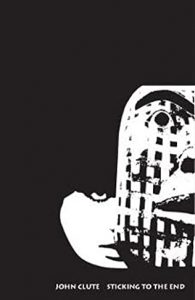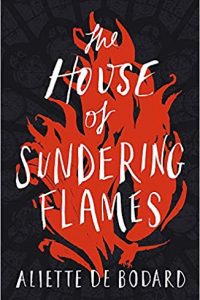Gary K. Wolfe Reviews Sticking to the End by John Clute
 Sticking to the End, John Clute (Beccon 9781-870824-66-8, £20.00, 415pp, tp) June 2022. Cover by Judith Clute.
Sticking to the End, John Clute (Beccon 9781-870824-66-8, £20.00, 415pp, tp) June 2022. Cover by Judith Clute.
Sticking to the End is the fifth of John Clute’s collections of reviews and essays to appear from Beccon, a small British publisher that for decades has specialized in SF reference and criticism (including collections by Paul Kincaid and yours truly). The title is sadly if coincidentally appropriate, since Roger Robinson – who essentially is Beccon – has announced that this will be the last Beccon book, although earlier books can still be ordered by contacting <www.beccon.org>. As a side note (and at the risk of unseemly self-promotion) it’s worth checking out.
So is any prior critical work by Clute, most widely familiar for spearheading The Encyclopedia of Science Fiction, which in its online form (<sf-encyclopedia.com>) has blossomed to about a gazillion words, of which Clute himself has written approximately a zillion. Impressive as that is, it’s only part of Clute’s heritage, which is perhaps the most substantial body of critical work that SFF has yet produced. In figuring out how to best approach it, we might take a couple of clues from Clute himself. In his review of Paul Park’s vastly underrated novel All Those Vanished Engines, he begins with a rather shameless pun from Julius Caesar, of all people: “Paul as a whole is divided into three Parks.” While this actually turns out to make sense in terms of Park’s novel, it’s just as true of Clute himself. It’s an example of what we might call the side-eye Clute, or the unfettered Clute, and it’s most familiar to those who have followed Clute’s review columns from the early Science Fiction Weekly and Interzone days to his “Scores” column in Strange Horizons, which is the source of most of the reviews collected in the current volume, all of which date from 2014 to the present. It’s also the Clute who rather waggishly describes his own style (in his SFE entry) as peppered with ‘studiously flamboyant obscurities,” a characterization with which I might quibble, except to note that he does manage to turn critical prose into an adventure. In his Introduction, for example, he notes that the title Sticking to the End is meant in part to reflect “a sense that the tesseractal interjaculations of fantastika are in danger of sticking to the end-moraines of this dishonored home planet abandoned by its glaciers and all other water.” Who would argue with that?
A second Clute, the encyclopedist, somewhat more stylistically constrained by the conventions of reference-book authority, is generously represented in this volume by some 59 short essays on individual films and TV programs, which are versions of SFE entries and which offer useful plot summaries (otherwise rare in the SFE) along with sharp critical insights, covering everything from blockbusters like Wonder Woman and Groundhog Day to classics like The Bride of Frankenstein. Yet a third Clute is represented by the personal and passionate voice we find in his appreciations of late friends and colleagues – John Sladek, Kit Reed, David Hartwell, Gene Wolfe, and Helen Nicholls (a couple of these appeared in Locus). This is also the voice we hear in a fascinating conversation with John Crowley, conducted at Readercon and published in Conjunctions, on the Mysterious Stranger theme, which is also the subject of an essay drawn from another SFE entry.
The origin of Clute’s influential notion of fantastika, which he most persuasively articulated in his essay “Fantastika in the World Storm” (included in his earlier volume Pardon This Intrusion) is here given a kind of historical etymology in “Fantastika; or, The Sacred Grove”, written for the inaugural issue of Fantastika Journal. In its simplest formulation, “Fantastika consists of that wide range of fictional works whose contents are meant to be understood as fantastic.” While this leaves us with the question of what is fantastic and to whom, it seems to me a far more convenient umbrella term for SF, fantasy, and horror than the unwieldy “supergenre” or “metagenre” suggested by earlier academic critics. But as with any critic, the best way to understand his pronouncements is in his practice, and the 44 books he reviews cover a wide range, from bestsellers like Colson Whitehead’s The Underground Railway to literary lions like Kazuo Ishiguro and Roberto Bolaño to more mainstream SFF names like Lucius Shepard, Jo Walton, China Miéville, Nalo Hopkinson, Kim Stanley Robinson, Ellen Klages, and – of course – Gene Wolfe, whose penultimate novel A Borrowed Man may have puzzled many, but whose “sad iron heart” is beautifully contextualized by Clute in terms of Wolfe’s other work. As in the best of his reviews, Clute can reveal complex texts as though they were those annoying Magic Eye illusion calendars popular a few years back, showing us not so much where to look as how.
Gary K. Wolfe is Emeritus Professor of Humanities at Roosevelt University and a reviewer for Locus magazine since 1991. His reviews have been collected in Soundings (BSFA Award 2006; Hugo nominee), Bearings (Hugo nominee 2011), and Sightings (2011), and his Evaporating Genres: Essays on Fantastic Literature (Wesleyan) received the Locus Award in 2012. Earlier books include The Known and the Unknown: The Iconography of Science Fiction (Eaton Award, 1981), Harlan Ellison: The Edge of Forever (with Ellen Weil, 2002), and David Lindsay (1982). For the Library of America, he edited American Science Fiction: Nine Classic Novels of the 1950s in 2012, with a similar set for the 1960s forthcoming. He has received the Pilgrim Award from the Science Fiction Research Association, the Distinguished Scholarship Award from the International Association for the Fantastic in the Arts, and a Special World Fantasy Award for criticism. His 24-lecture series How Great Science Fiction Works appeared from The Great Courses in 2016. He has received six Hugo nominations, two for his reviews collections and four for The Coode Street Podcast, which he has co-hosted with Jonathan Strahan for more than 300 episodes. He lives in Chicago.
This review and more like it in the Sepetmber 2022 issue of Locus.
 While you are here, please take a moment to support Locus with a one-time or recurring donation. We rely on reader donations to keep the magazine and site going, and would like to keep the site paywall free, but WE NEED YOUR FINANCIAL SUPPORT to continue quality coverage of the science fiction and fantasy field.
While you are here, please take a moment to support Locus with a one-time or recurring donation. We rely on reader donations to keep the magazine and site going, and would like to keep the site paywall free, but WE NEED YOUR FINANCIAL SUPPORT to continue quality coverage of the science fiction and fantasy field.
©Locus Magazine. Copyrighted material may not be republished without permission of LSFF.







